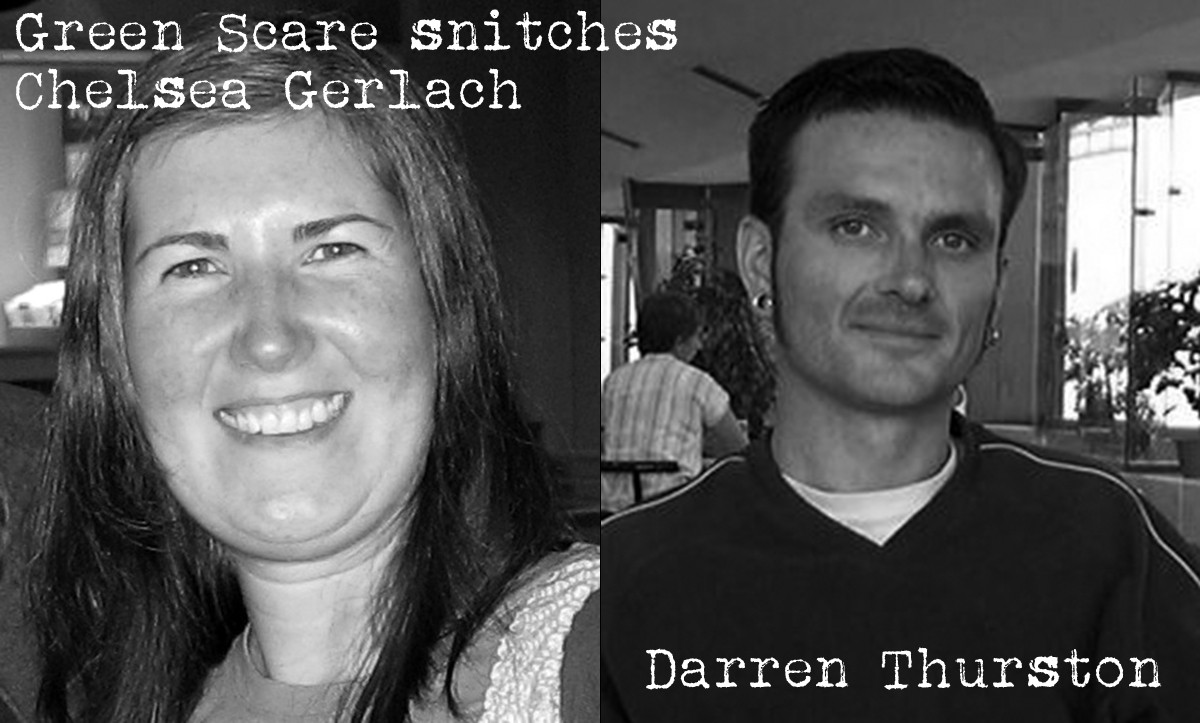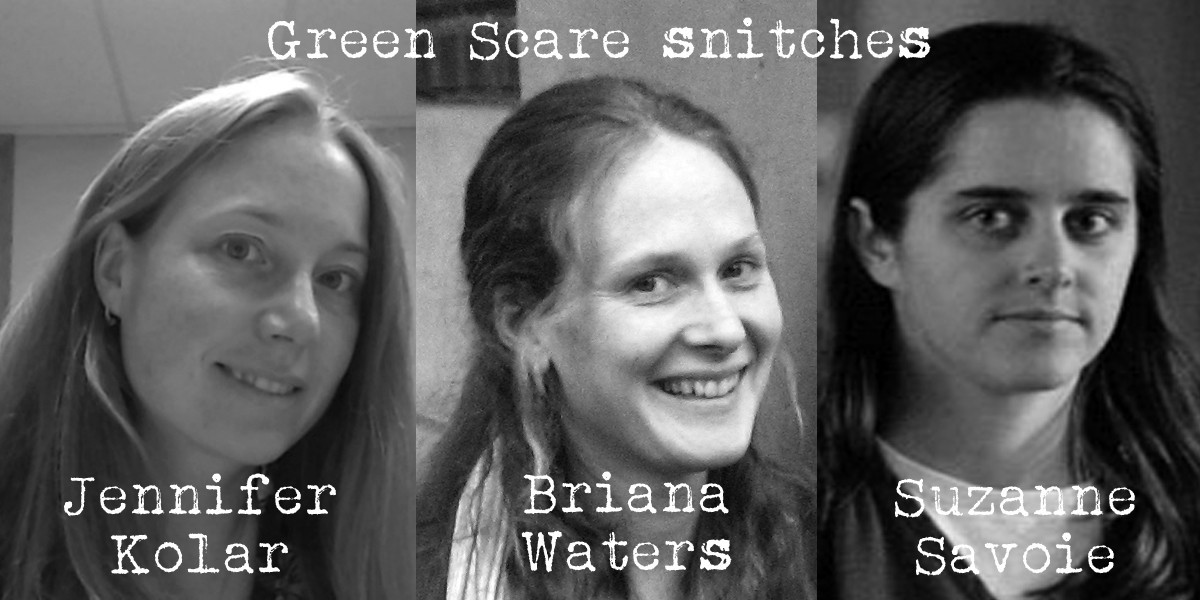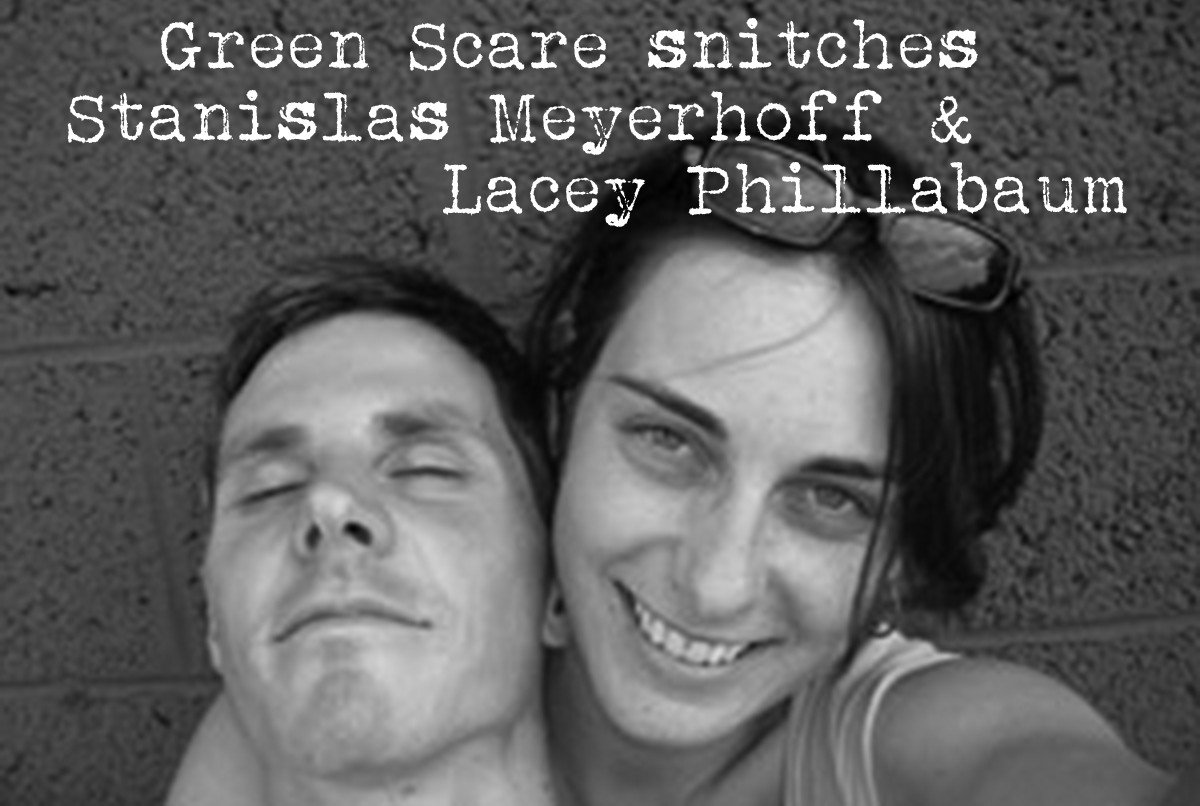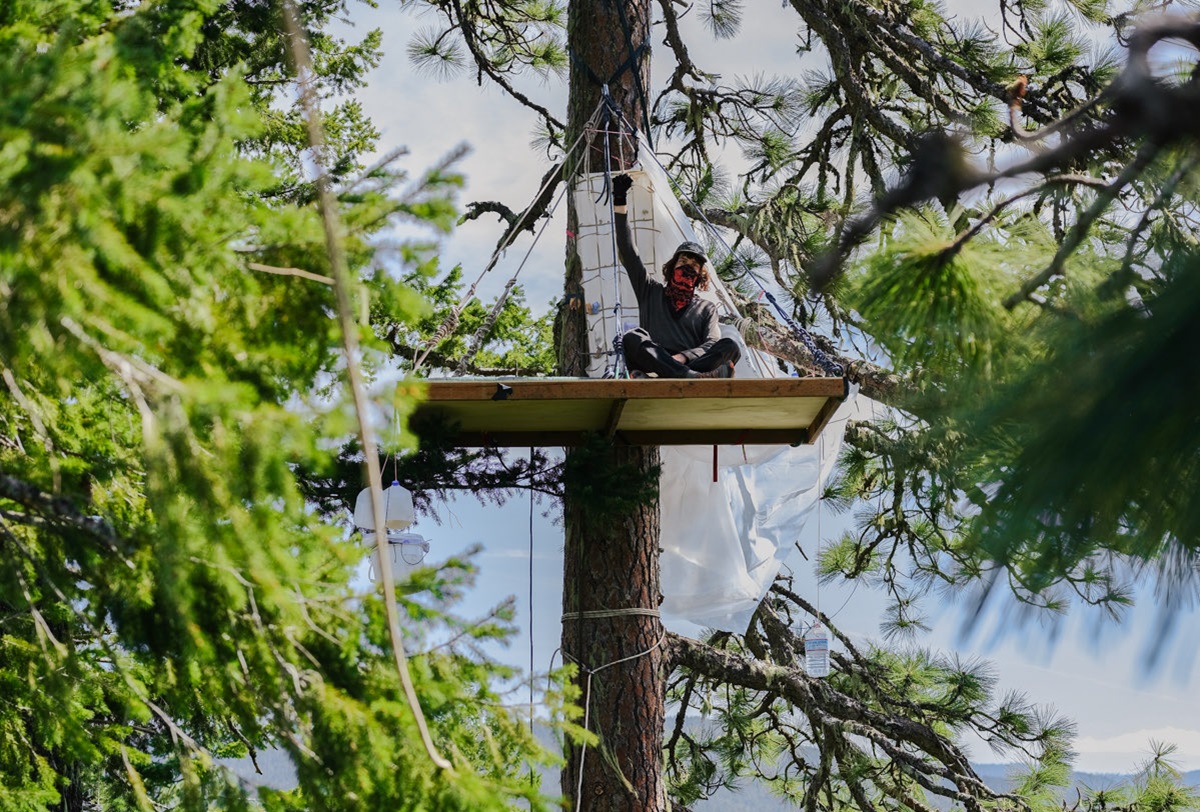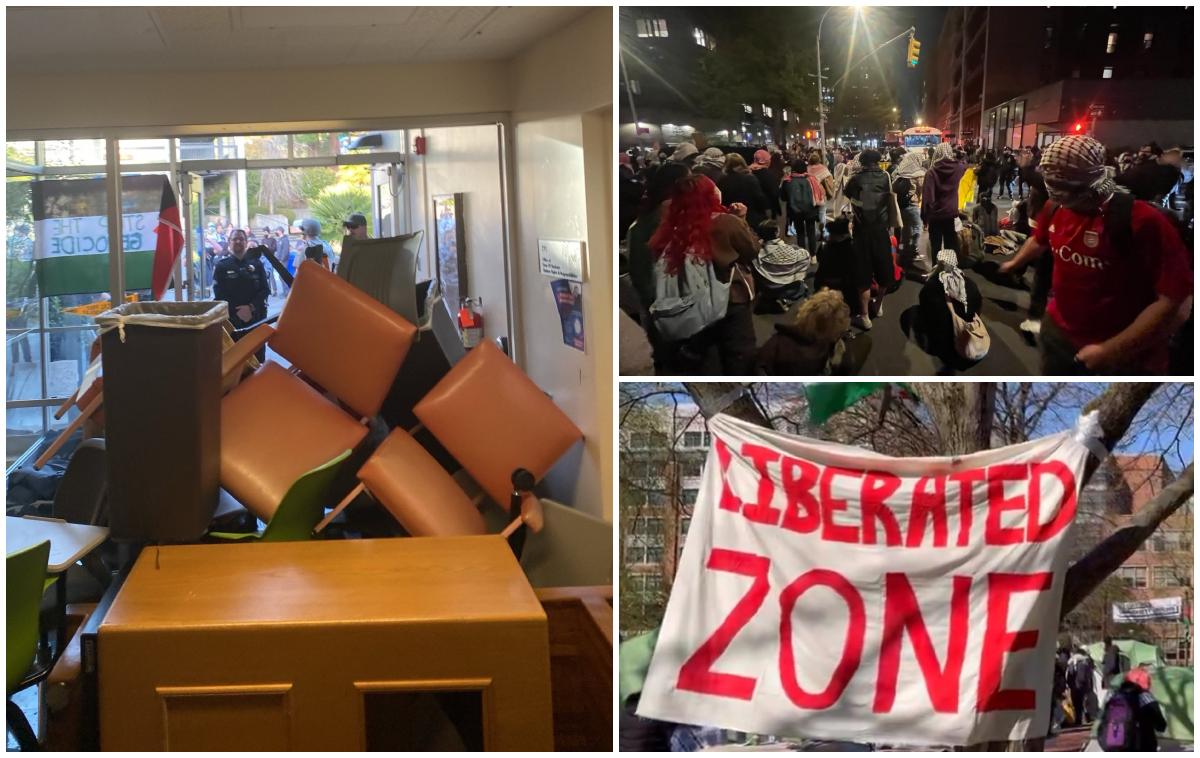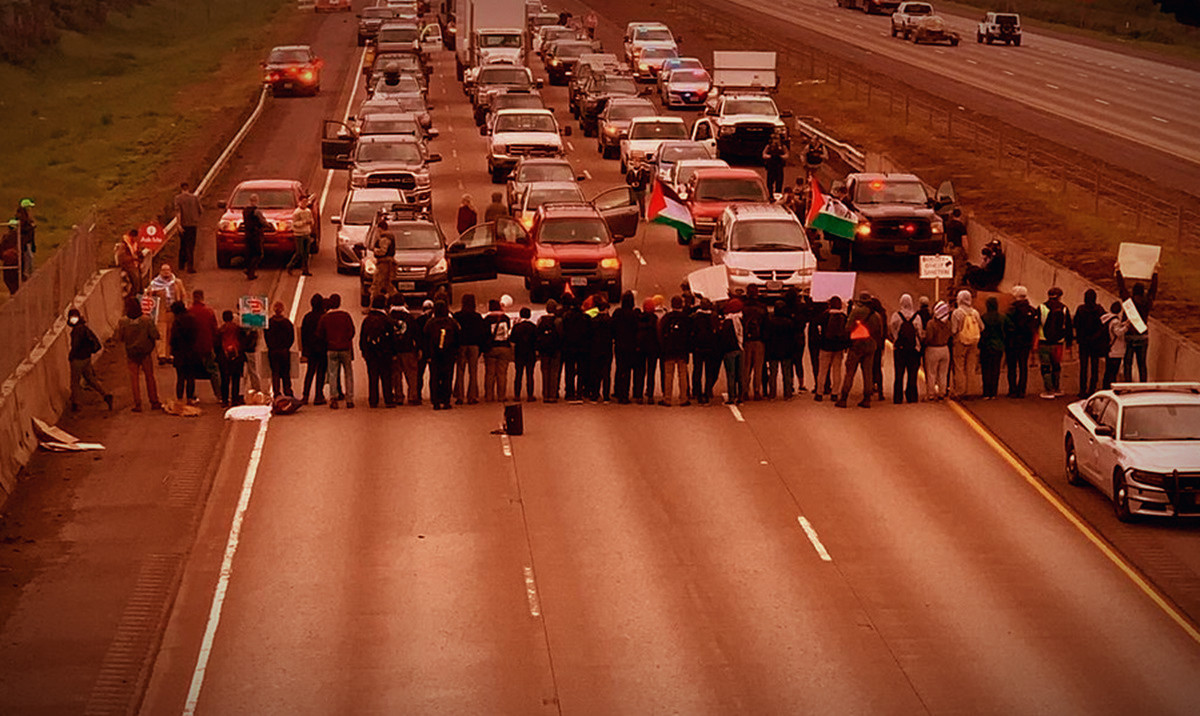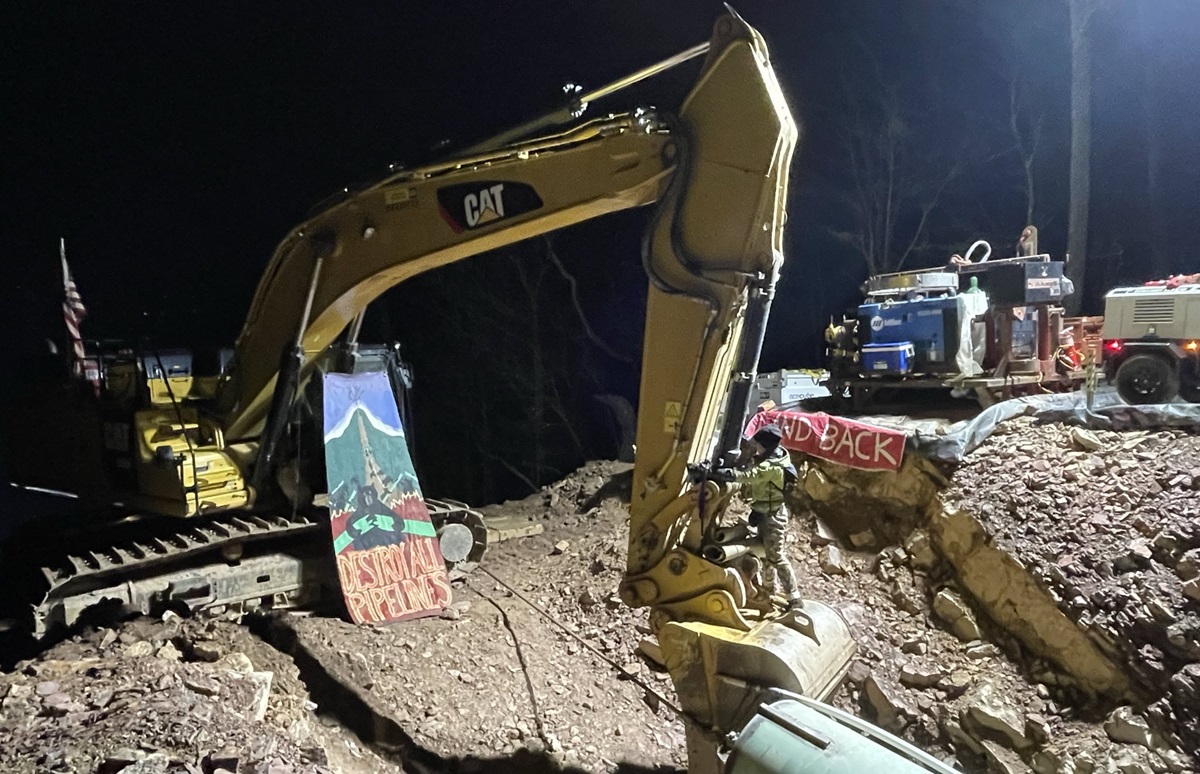Filed under: Anarchist Movement, Animal Liberation, Civilization, Environment, Interviews, Repression, The State, US

From Black and Green Review #3
As an attorney and long-term activist Lauren Regan has a vantage on state and corporate surveillance that few other activists are exposed to. Regan is the founder and Executive Director of the Civil Liberties Defense Center based in Eugene, OR. She has an extensive history of defending activists after inevitable run ins with the law. She represented a number of Green Scare defendants and has arguably spent more time sorting through Green Scare, AETA, and other similar cases to know about the extent of government and corporate surveillance, disruption, provocation, and how failures of Security Culture opened the door for them.
-Lilia, BGR
What has been one of your more profound encounters with informants within radical action communities?
After moving to the Pacific Northwest I became involved with forest defense campaigns, and ultimately ended up doing a lot of legal support for my friends. Several years later Lacey Phillabaum was one of my housemates for a short time period. Then in December 2005 a bunch of my friends, fellow activists and clients were arrested as part of the Green Scare. Lacey came to me, freaking out that she was being asked to become an informant, and that Stan (Stanislas “Stan” Gregory Meyerhoff) had become an informant.
I told her that we would try and support her in whatever she needed to avoid being in that situation. The next thing I know her and her father are meeting with me and informing me that they are about to go and meet with the FBI, and she was going to become an informant.
That was that, I thought. But a couple of years later I’m on Briana Waters’ legal team and we’re going to trial for the first time, and she’s facing life in prison with a 2 year old baby, and Lacey Phillabaum is testifying against her to try and put her away so that Lacey could get less time in prison. I’m sitting at the legal table watching the direct examination by the U.S. Attorney’s Office and all of a sudden Lacey points me out, sitting at the counsel table, and said “Lauren Regan knew what we were doing, or she should have known.” She perjured herself and basically tried to get me indicted.
Luckily it didn’t work.
When Lacey and her father met with you was that as a lawyer potentially representing her, or just as a personal friend?
No, it was as a lawyer who was a friend of hers at the time.
The day that the Green Scare bust happened, me, Jim, Lacey and Stan and a few other of our friends were all flying to Costa Rica for a friends’ wedding. Jim and I and several other friends were already in Costa Rica when Stan got detained at the airport on the way out. Lacey started calling me in Costa Rica freaking out, and there was not much I could do at that time. But I remember she read me the names of all the people who had been detained, and that really scared me because there were names on that list that I could not believe would have been involved in economic sabotage at this level.
So I thought conspiracy – this is a witch hunt – this was a broader net than it needed to be. Primarily it was Daniel McGowan’s name that surprised me the most because he worked very closely with me on Jeff Luer’s appeal and prison support campaign. So the idea that he would be Jeff’s #1 support, and so close to being indicted himself seemed reckless. I thought there’s no way Daniel is involved in this, but clearly he was.
As someone who lived with Lacey do you feel that there was behavior or personality traits that you feel made it not surprising that she eventually went down that path?
No, and here’s why. Lacey was one of the most militant, hardcore security culture nazis in our town. When people were subpoenaed to the grand jury she would be standing outside the door with a pad of paper trying to be the community scribe of everything that was asked and everything that was said, and if you didn’t fully debrief with her you were persona non grata.
If you disobeyed the militant culture of security culture as people pretended to adhere to it, she was down your throat in a second. So for her to just fold like a house of cards upon the first application of pressure, that was surprising.
She had been together with Stan for a while – a couple of years maybe – and they had this awful relationship. He punched her in the face a couple of times. They were just nasty to each other. In my head I thought, here’s another smart woman who is so insecure in herself that she’s with this piece of shit guy. She was leagues above him in many respects.
I wondered “why are they staying together?” She’s living with me, and he is coming over occasionally, and he’s as dumb as a piece of toilet paper. Whenever he would come over to my house I would remember he would often ask “How is Jeff (Luers) doing?” Jeff is in prison at this point, and I just assumed that because so many people knew I was Jeff’s lawyer and lots of people who weren’t really in the scene would approach me and ask “How’s Jeff doing?”, so I never thought anything about it that Stan was asking about Jeff.
Of course in hindsight I realized that Stan was involved in the Romania #2 arson (Jeff was charged with Romania #1, and Romania #2 occurred on the day Jeff’s trial was supposed to begin in the same town the arsons occurred. Romania #2 is suspected of playing a part in the Court imposition of his original 23 year sentence) and had tremendous guilt over Jeff’s sentence.
So at some point Lacey told me that her and Stan were moving to Bend, OR. At the time, to be frank, I thought it was a domestic violence maneuver. That he wanted to get her out of town. But even when she moved to Bend occasionally we would go hiking together and things like that.
Was it an intense experience realizing that a long term friend, someone you had lived with, gone on hikes with, could fold so easily?
Yeah, of course. It was the first time in my life, as well as many other people’s lives around me, where we had to write off friends as if they were dead. We were burying people left and right. People who cooperated with the grand jury, people like Lacey, we lost a dozen humans out of our community forever. That was like a mourning process.
And if that had been it, that would have been tolerable. But when she actually tried to take me down in addition to it, that’s when I got mad. That’s why people in this community that have remained friends with her unfortunately can no longer be friends with me either.
She’s very smart, and was a journalist so she’s very good with words. Both of her parents are lawyers, she was a debate captain, so she can be very good at persuading people. She can be both effective and dangerous. It was a big loss to the movement to lose her in this way, potentially over a guy too. Because if Stan hadn’t squealed, I don’t think she would have had any reason to. I think the reason she became an informant was because he completely snitched her out, then she basically wanted to stand with him.
That brings up an interesting issue that I don’t think many people talk about, in terms of intimate relationships and how often those are related to situations where people end up informing, or there are informants that get into relationships with people and then snitch on them. Do you feel like that’s a recurring enough theme that it’s something that we should be thinking and talking about more?
I think human frailty and human dysfunction on all sorts of levels become a huge problem whenever you’re dealing with high stakes security culture issues. Whether it’s drug addiction, or whatever it happens to be, there’s always issues like that which come up.
Within the Green Scare you had Darren Thurston jumping off the non-cooperation ship, as a result of pressure from Chelsea Gerlach, who was his romantic partner at the time. And Chelsea was specifically attempting to flip people so she could get bonus points from the Feds. She met with many of the non-cooperators to try and get them to flip. So there certainly were a few examples of that within the Green Scare.
On the other hand there are examples to the contrary, like Joyanna and Nathan, who were a couple who stuck together and did not snitch. I can see it going both ways.
On the other hand, it is my understanding that Jennifer Kolar (Green Scare cooperating defendant), who dated Joe Dibbe (indicted in Green Scare, never apprehended) and Jonathan Paul (Green Scare non-cooperating defendant) at different times, flipped her blonde hair around and wiggled her way into very critical areas of the movement primarily because she was having sex with activist men. She was probably not vetted as she should have been. She not only flipped as soon as it hit the fan, but she gave up all the passwords and technology related things that ended up being very bad, damning evidence against a lot of different people.
Have there been any other examples aside from “Anna” (who entrapped Eric McDavid) that you know of, of the FBI or corporate security actually sending people in to have relationships with activists?
Oh yeah. There are a number of proven situations where I’ve read the FBI reports myself where men have been targeted with female FBI agents that posed as interested parties for the purposes of infiltrating.
In my experience it’s been men targeted by women. Although I know in Europe and other places it’s definitely been the other way. And certainly with Peg Millet (one of the ‘Arizona 5’ accused of conspiracy to sabotage nuclear power plants and destroying power lines) and her fellow activists in Arizona, it was the reverse, with a male being sent in to infiltrate.
In my experience since the late 90s, I think female agents are used more often because there are more men in the direct action oriented frame of environmental and animal rights stuff, and younger men with a lot of testosterone that are very vulnerable to that type of thing; and statistically more men were committing acts of direct action, that it made a lot of sense for the FBI to be targeting men with women.
How do you think the Green Scare has impacted the green anarchist/radical scene?
From traveling around the country and doing a lot of government repression types of talks, that integrate AETA and Green Scare related issues, I have certainly had a lot of people both long term activists and newer ones tell me that things have been different since the Green Scare. That things are not as active since the Green Scare.
I think that may statistically be true in terms of economic sabotage, but in terms of the grassroots movements—anti-tar sands movement and some of the climate justice groups that are now including undocumented immigrant communities and things like that, I don’t see there being a huge deterrent to people getting active along those lines, at least in the last 5-7 years or so.
In discussions I’ve had with people they say that the Green Scare had an impact because we’re not seeing arsons anymore, but I think that the reality was that after that binge during the late 90’s and early 2000s, even people who were participating in those actions were having some serious reconsideration about the way the tactic was being implemented, and the potential for serious back lash. As well as some serious discussion going on about the effectiveness of it. Things were being rebuilt, like Vail (Ski resort in Colorado where $12M arson occurred). There were very few examples, Cavel West Slaughterhouse being one of them, where the target was not rebuilt. In nearly every other circumstance, the targeted property was rebuilt or repurchased. So I think there was a lot of internal discussion, and it was valid, and I think, a necessary discussion. So it’s hard to say whether or not the underground movement itself put limits to that, versus it actually being government deterrence. By the time the [Green Scare] prosecutions happened in 2005 the actions had already pretty much stopped. Most of them stopped in 2001, and I think there was 1 or 2 that happened in 2003. Then the indictments didn’t come down till 2005. So to say that the prosecutions were a direct result of ending that tactic, I’m not sure that factually plays out.
The FBI has been teaching very real world methods of observation, tracking and intrusion for a long time, but are using more high-tech surveillance these days. Is it likely that they are still using those ‘real world’ techniques?
Oh of course. As part of the FBI/JTTF training they are using younger agents who are tattooed, who learn vegan-talk, who basically go to boot camp to specifically be able to integrate themselves into anarchist / activist scenes. That is absolutely still going on. The ability for the government to spy on activists has only exponentially increased. In addition to government surveillance we are also seeing an increase in ‘gray intelligence’ – corporations spying on campaigns. Particularly in the anti-coal, tar sands, pharmaceutical – you know – environmental and animal rights targets, climate justice targets, all have very big industries behind them and we’re seeing a lot of both illegal and legal spying tactics by them as well.
So you think corporate surveillance is definitely on the increase?
Oh yes.
Do you know some examples of how people are finding out about that? Because you wouldn’t think it would come up on public records very often.
Well believe it or not, some of the private spy agencies screwed up by voluntarily sharing their reports with the FBI and local law enforcement agencies. Once they did that, all of those reports are subject to FOIA and public records laws, and that’s how we actually got a lot of the stuff out.
For example, TransCanada was giving powerpoint presentations to FBI offices and local law enforcement agencies along the [Keystone] pipeline route. We actually got their whole powerpoint presentation, which included photos of lead organizers, and all of the federal terrorist crimes that they were encouraging local DA’s to use against activists, and things like that. Some of it we actually got through their own stupidity.
But there are lots of things that they can do that would be really difficult to catch them on, particularly electronic surveillance. A lot of the gray spies are former FBI agents, and so there is a real muddy zone of old and new buddying up with each other. Old FBI calling up new FBI and saying “hey, do me a favor and run this through the computer.”
What information do you think informants and undercover types are particularly after? What is their core aim in terms of the information that they are gathering?
Well I think from the government’s perspective one of the main goals is psychological profiling, and attempting to map movements and activist communities for future targeting. I think that is a huge part of the goal. I think a lesser part of the goal is actually trying to stop and fight crime…
Or sometimes create crime…
Right, right. Especially I think in a post-Green Scare world where now, because of the level of disclosures that were made by all of these ELF and ALF underground cell operants, the feds are now very aware of how underground activists work. I think that akin to the COINTELPRO era, another major interest of the government in using spies and infiltrators is just the mere interruption of political activity that challenges the current social structures.
There are FBI anti-terrorist reports that I have read where they specifically say that anti-capitalist activism is one of the hugest threats to American society, and that is because of the buddy relationship between the government and these giant corporate profiteers. It’s the government doing the bidding of these giant industries and corporations, so anything that is a direct challenge to that is not only being spied upon, but anyway that they can interrupt, interfere, malign – you know – they don’t want that movement to build.
Sometimes it’s not about trying to prosecute anyone at all, it’s basically about trying to divide up a community and interfere with successful campaigns. We see it over and over again. But because this is a big country and a big activist community we don’t really talk as much as we should to be able to see that a certain thing happened in the Tar Sands campaign, and this is happening in the wolf campaign, and the same thing is happening here and there. What is the common situation that is going on? A lot of times it is that the government understands, from it’s past spying, how easy it is to fuck with most activist communities.
Again, because of the human weakness, because we don’t learn our history and we continue to repeat it. We don’t take ourselves as seriously as we should as movement activists. The government preys on all of that and has the same playbook that they play out all across the county over and over again. Every couple of years they can come back and it’s a new batch of activists and they can do the same thing again.
Speaking of which, why does security culture matter?
Security culture, in my mind, is not primarily about how to get away with criminal activity. It is about creating an environment and community where those that don’t want to engage in criminal activity can be safe from grand jury subpoenas or aiding and abetting, or conspiracy charges as well. So security culture is an across the board agreement on how political activists – who are the targets of government and other kinds of repression – can be as strategically effective as possible and create safe boundaries for people, as best as they can.
A long term activist did a FOIA request that came up with some interesting information about how pre-9/11 environmentalists were being targeted on as potential users of WMD’s. Do you know if there was any exposure of informants or spies in that program / investigation?
The incendiary devices that were used in the mid-late 90’s were considered deadly devices, and that’s why the terrorist enhancement stuck for a lot of the Green Scare defendants. But over and over again we see documentation from FBI agents, as well as corporate spies. For example, there is an anti-fracking group in Pennsylvania, and it’s made up of teachers and doctors, and once a week on Friday afternoon they get out their banner and go down to the busy corner of this little town and they stand there and hold their anti-fracking banner. A corporate spy had been monitoring them, and had been writing a terrorist bulletin that they shared with law enforcement and the FBI, which is how we ended up getting it. The bulletin repeatedly said “they’re holding a banner and they’re doing this non-violence stuff now, but their rhetoric is getting more militant and they are going to move onto more violent activity, so we need to continue to monitor them….”
I think that generally speaking, law enforcement, in order to ensure the longevity of their jobs, and the continued funding, and gross increases in funding, there has to constantly be a threat and an increasing threat. You’re never going to see the government saying “environmentalists learned their lesson, they’re not going to do that stuff anymore.” In the Green Scare they said “they may be doing property damage now, but they were going to be moving onto assassinations.”
I assume that’s enhanced so much more with corporate surveillance and private security agencies, which are so focused on helping drive profit growth?
The way a lot of them work, say Peabody Coal for instance, they know they can’t have in-house spies. Because if that gets back to them, they get in trouble. So they set up and fund a separate private entity that is half-PR firm and half-security firm. In order for that entity to remain operational they have to produce information that Peabody Coal wants to hear, and they have to be validating their own job. So if they were to report “doctors and teachers are holding a banner every Friday” they are going to be pulled off that case, and they’re not going to get paid to do that anymore. What retired FBI agent doesn’t want to just sit around and watch a bunch of peaceniks hold a banner, versus going after drug smugglers or something similar. They are perpetuating their own economic gain through that process as well.
One of the more classic examples is the private spy group that changes its name every other week that targets PETA on behalf of the Ringling Brothers and big pharma. They literally had spies employed by PETA and stole computer files, and things like that.
A huge issue though is the extent that activists are making the government and private spy’s jobs so easy by using facecrack or email to put the most dirty laundry of movement participants out into these public domains. They are basically giving them clear road maps of where vulnerable targets for government repression might be located, or who might be more likely to be a snitch or an infiltrator.
For me personally whenever I see some of that stuff happening I am really suspicious of the sources of it. It seems unbelievable to me that someone who calls themselves an activist, and has any level of education about what being a political activist means, would originate or perpetuate that type of thing in the public sphere. That’s not to say that I don’t think that in certain circumstances a community shouldn’t go to someone’s house and do an intervention, or have some kind of accountability process. But that accountability process should never ever be over facecrack, or computers at all. The idea that everybody gets to vicariously watch somebody get tarred and feathered is ridiculous. Watch the Kardashians on TV if you want that level of drivel. If you live across the country and you’re not involved in that campaign, you don’t get to be a part of the accountability process. The gossip loving nature of the fallible human just seriously gets in the way.
Rather than being worried about spies and surveillance we really need to take ourselves a lot more seriously. People pay lip service to security culture and then they get on facecrack and act as if the concept doesn’t exist. It’s more than just a cool phrase while you’re drinking beers with your friends. It really does mean things to people, and those that don’t take it seriously aren’t taking themselves seriously either.
A lot of times when people do air dirty laundry on social media they use the rhetoric of “I’m just trying to keep people safe by letting them know this information about this person.” But if you bring up the safety of security culture it’s completely dismissed.
That’s right. There’s a way you can keep a community safe without doing that mass distro-style thing. I remember there was a person who we outed as a federal infiltrator. He was a drug convict who was working his punishment off by trying to spy on environmental activists. He stole money from an environmental campaign and caused a bunch of problems and divisions. The way we were actually able to out him was after a couple of people ended up getting federally prosecuted, I found in the discovery that I received from the US Attorney’s Office all the receipts for this guy’s reimbursements and his daily log notes. They had inadvertently turned it over to me. They quickly realized their mistake and asked me to return them, but I had already given them to the clients, so it was already out there. So he got outed and then we heard that he fled town. But someone had some understanding that he was actually headed up to the Buffalo Field Campaign. We were able to call them, and I remember I faxed a black and white photo of the person to them, and said “hey this person may be heading in your direction, keep your eyes out.” And they did, and they were able to shoo him on. The idea that some mass dissemination is the only way to keep communities safe is ignorant.
It seems to be a huge reflection on the very sudden change in our communications, with social media having become so central. A lot of people have grown up with that now, and understand it as the norm.
In doing teen ‘Know Your Rights’ trainings that we’ve been doing it’s clear that this new generation has been reared with metal detectors and no sense of privacy at all. They don’t understand what a right to privacy is, and why someone would be up in arms about that at all. They are so acclimated to a big brother, and nothing being private ever, that that’s going to be the new cultural norm eventually. Which is exactly what the government has indoctrinated people to adhere to.
They have been extremely successful in that. Do you have any thoughts on how you resist that? Do you just keep off social media?
It’s going to be so hard because of course mass media and the giant systems that have been set up, like facecrack, are reaching millions and millions of people. Not only in the US, but around the world. Our ‘Know Your Rights’ trainings, or any kind of political education, are not taught in the public schools. There’s such a tiny minority of youth that will even be exposed to any semblance of this, that I don’t have a lot of optimism. I think the only way that it could be really seriously reversed is if there is some major political upheaval that occurs.
Access “Know Your Rights” training resources and more at cldc.org


